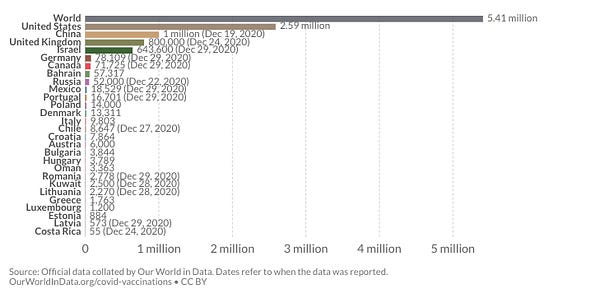A Few Notes on Israel 🇮🇱
Today: Israel is racing ahead when it comes to administering vaccines. What does that say about the country?

The Agenda 👇
Israel is racing ahead when it comes to vaccines. What does it tell us?
One interesting thing: Israel is pursuing an “infinite ideal”
Another interesting thing: the Hebrew language
Yet another: what young Israelis learn in the military
Finally, Israel really needs to be connected to the world
Links to various articles to go further on Israel and other things
🇮🇱 For anyone interested in startups, Israel is a most interesting country. Not only has it delivered results when it comes to growing successful tech companies, it also distinguishes itself as an entrepreneurial society in many ways.
What struck me when I visited back in 2018 was just how the whole country displayed the features of a healthy entrepreneurial ecosystem—which clearly explains why they’re so good at tech entrepreneurship. When an entire country has an entrepreneurial ethos, it’s no wonder why it would race ahead in building successful ventures!
Recent days have seen Israel outperform once again, this time when it comes to implementing the COVID-19 vaccination campaign. To date, more than 12% of the population has been administered a first shot, which is in sharp contrast with the situation in the likes of the UK (less than 2%) and my native France (only a few hundred people in total 🤔).
Entrepreneur and scientist Yaniv Erlich makes the point that it’s due to the entrepreneurial approach that permeates Israeli society—one that relies on “organized chaos”:


What makes Israel so successful in maneuvering and delivering results despite adversity and widespread uncertainty? I would be interested in hearing your views, but there are several features that come to my mind. One is the long-term perspective inspired by the very project of building Israel as a country. Here’s a quote by Theodor Herzl, the founding father of Zionism:
I once called Zionism an infinite ideal, and I truly believe that even after we achieve our land, the land of Israel, it will not cease to be an ideal. Zionism, as I see it, entails not only an aspiration for a piece of land legally ours, but also for moral and spiritual integrity.
It’s good to have a long-term goal, especially one that can never be really achieved. It creates a sense of alignment that makes it easier to take action right away and to try new things all the time.
Indeed, Israel is a young country, one which has been built over the course of only 70 years—but it’s also a country that has already been reinvented many times, from David Ben-Gurion’s early vision of a socialist state to the ruthless entrepreneurial powerhouse that it has become today.
This spirit of constant reinvention and resilience is clearly being seen with Israel’s vaccination campaign. Here’s what Daniel Gordis wrote yesterday in a beautiful article published by Bloomberg:
Israel, like most countries, still has enormous obstacles to address, many of them important, a few of them existential. But there are still moments here when we recognize that this is not a country like any other. It is a country that was founded to give sanctuary to a particular people that desperately needed it, one that has weathered more in seven decades than most countries do in centuries, and that has produced a sort of familial resilience that can’t be replicated anywhere else.
For decades, Israelis have often gazed across the ocean at Americans, wondering when we could be just like them. These past few weeks, we’ve been profoundly grateful to be just who we are.
Another interesting feature in Israel is the level-playing field that’s the Hebrew language. Every Jew is welcome to settle in Israel (although I hear it’s not easy for everyone since living in Israel can be quite a rough experience), but every newcomer has to learn Hebrew so as to mingle with the rest of the Israeli society. There’s no advantage for those who come from a specific region in the world, and I bet so many people speak with an accent that nobody pays attention to it anymore.
Having that common language makes it easy for Israel to attract talent—and the ability to attract talent is a key institutional feature of any healthy entrepreneurial ecosystem. Israel offers its own version of turning a language into a competitive advantage:
In London, English is spoken by the locals but it’s also a language that every newcomer is ready to learn—or already speaks as a second language. Therefore English has become a competitive advantage for London as an entrepreneurial ecosystem.
In Singapore, English is just one of the languages spoken by the locals, but it’s the only one they all have in common. That’s by design: Lee Kuan Yew wanted a shared language for local communities that spoke Malay, Tamil, Hokkien, or Mandarin. He (wisely) chose the one that would make sure that Singapore connected with the rest of the world. (It was also the one he personally mastered best, having been raised exclusively in English.)
And while Hebrew might not be spoken much outside of Israel, even among the global Jewish community, it’s at least considered normal for newcomers to keep trying and eventually master it. If you’ve decided to settle in Israel, nobody will look down on you because your Hebrew is still halting. Conversely, you shouldn’t expect that speaking English will be enough for you to become a part of the local society: you really need to speak Hebrew!
A third interesting approach is the communication that young Israelis learn in the military. In meeting quite a few founders and investors there, I was told many times that the best founders and most talented employees were all from the elite units in the Israeli military. That is where they learn many things that make all the difference when building startups:
In the military, threats are numerous; when they materialize, it’s usually without warning. You can never rest or take anything for granted. You have to evolve in a context of widespread uncertainty as to what comes next. This is a very useful skill in startups!
A specific approach has been developed in the military to cope with this uncertainty. One feature is that a shared culture makes it easy to understand each other and to iterate quickly in the spirit of innovation.
Another feature is that it’s apparently fine to challenge your superior. When the order is confirmed, you have to follow it. But in the meantime you can still offer a different perspective as to what should be done, even experimenting with different ideas until they’re proven wrong. (And apparently once your years of military service are over, you really want to be your own boss, so there are two things here that contribute to fueling entrepreneurship: a different relationship with authority and the eventual wholesale rejection of it.)
I can’t think of a better source to dig deeper into that topic than this inspiring conference by Saul Singer, one of the co-authors of the enlightening book Startup Nation 👇 It’s about education—and Singer seeks to answer the following question:
If a small group of elite soldiers can learn those incredible skills in the military, why can’t we teach them to every child at the scale of the entire school system?
Finally, what strikes me is how connected Israel is to the world. One one hand, it’s outward-looking, not only through the diaspora but also in its constant search for reliable allies that can help it cope with its fragile geopolitical position.
On the other hand, it also attracts many people from the rest of the world—whether Jewish people making aliyah or simply people who, like me, want to visit and learn a thing or two about how things are there. It provides ready inspiration for other people in other entrepreneurial ecosystems.
Israel’s global outlook probably explains why it’s being so effective at implementing their vaccination campaign. When you face so many threats, you don’t want to add additional problems such as frequent lockdowns and/or a sick population, so you’d better vaccinate everyone without delay. When your security and prosperity depends on a vibrant and close relationship with many other parts of the world, you want borders to be open and the flow of people, money, and ideas to be easy. The world might be fragmenting at a fast pace, but in such a context Israel can only succeed if it doubles down on building bridges and connections across borders. That, too, requires vaccinating people without delay.
Fun (?) fact: one of the many things my wife and I had to cancel last year because of the pandemic was a 10-day trip to Israel in April, just the two of us—something we were really looking forward to, if only to visit friends, see incredibly beautiful places, feel the vibrancy in the streets, and eat the excellent food. I do hope I can go back again at some point.
What’s your experience with the Israeli entrepreneurial ecosystem? Interesting sources you recommend to learn more and challenge some of the ideas I wrote above?
On vaccines in Israel:
How has Israel launched the world’s fastest Covid vaccination drive? (Oliver Holmes, The Guardian, December 2020)
Covid Vaccination Miracle Has Brought Israel Back to Its Roots (Daniel Gordis, Bloomberg, January 2021)
On Israel and startups in Israel:
Education and the future of Start-Up Nation (video—Saul Singer, Israel EdTech Summit, June 2016)
Israel, The Original Startup Nation (European Straits, November 2018)
Ben-Gurion's Letters to America (Ben Judah, The American Interest, November 2019)
On entrepreneurial ecosystems:
What Makes an Entrepreneurial Ecosystem? (The Family Papers, October 2015)
5 Steps to a Healthy Entrepreneurial Ecosystem (The Family Papers, July 2016)
Anyone Can Build an Entrepreneurial Ecosystem (European Straits, July 2020)
On languages:
The Power of the Tongue: English in the Digital Economy (The Family Papers, January 2016)
Languages in Singapore (European Straits, March 2019)
What Language Should Startups Speak? (European Straits, November 2019)
If you’ve been forwarded this paid edition of European Straits, you should subscribe so as not to miss the next ones.
From Munich, Germany 🇩🇪
Nicolas






Another possibility is a political explanation, rather than a geopolitical one.
As the government collapsed end of December,
Israel is heading towards new elections. The country's fourth election in under two years.
Current Prime Minister Netanyahu is in big trouble (economic damage caused by the pandemic, corruption).
He is not a stateman, just a politician.